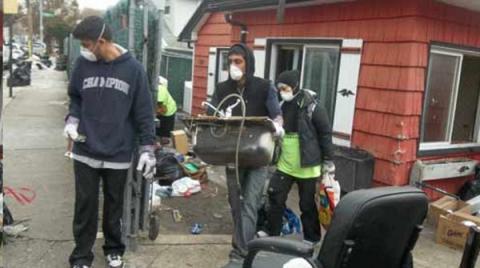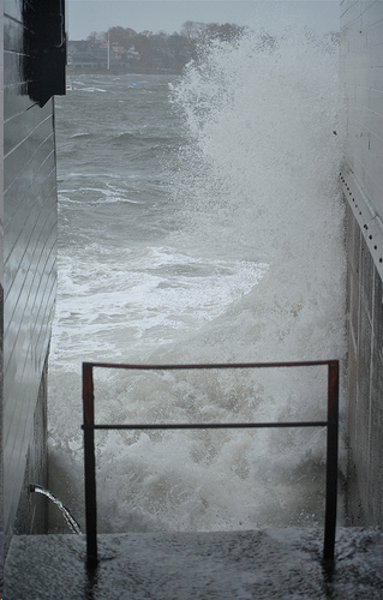Displaced ‘Basement People’ Emerge From Shadows After Hurricane Sandy

From New America Media:
BRIGHTON BEACH, NY — Almost a month after Hurricane Sandy ripped through this densely populated beach community, Mohammed Alhamshali still has no permanent home.
He can no longer return to the basement of a single-family house that he had rented on Neptune Avenue, a few blocks from the storied Coney Island beach and boardwalk. In fact, he couldn’t even find his landlord.
When he came back to check on his property for the first time, he hardly recognized the place.
"It's not livable anymore,” said Alhamshali. “It’s now an abandoned house.”
Having lost all his belongings, Alhamshali has shuffled from one apartment to another, staying with friends since superstorm Sandy battered several Northeastern states last month.
The storm hurled wind and rain on the city’s residents, causing flooding in low-lying areas. The rising waters flooded the subway system and crept into homeowners’ basements, where it disrupted the power supply. It also brought out of the shadows the predicament of so-called “basement people” – renters (some undocumented) living in illegal dwellings, who are especially vulnerable in times of disaster.
As he set about the task of rebuilding, Alhamshali faced hurdles that made the recovery harder. Because he is not a permanent resident or a U.S. citizen, he’s ineligible for any federal relief assistance through FEMA, including temporary housing or reimbursement funds.
In possession of a valid visa to reside in the United States, Alhamshali was concerned that it would affect his application if he would ask for government aid. In addition, he is wary of drawing attention to the fact that he was living in an unlawful converted dwelling.
FEMA’s temporary housing program, which offers hotel or motel rooms to those displaced by the storm, has been extended to Dec. 14.
The agency has also conducted a “Rapid Repairs” campaign, where contractors are assigned and sent to areas hit hard by Hurricane Sandy. The government-paid contractors are responsible for bringing in plumbers, electricians and other sub-contractors.

“When my family lost all our belongings, we knew we would not be able to get anything back,” said Mariano, who declined to give his last name. Speaking in Spanish through a translator, he added, “We can’t ask [for assistance] from our government officials because we have no legal papers.”
Mariano, his wife and three young children lived in the basement of a house on West 8th Street. As the storm surge began flooding their place the night of the storm, they sought refuge in the building owner’s unit on the second floor.
The owner allowed them to stay there for a week. With no power and heat, they slept in their winter jacket on a cold floor.
But when FEMA inspectors showed up, the homeowner told them not to mention that they were living in the basement. “No one should know that we are renting it,” Mariano added. “We understand that part.”
According to the NYC Department of Housing and Preservation, basements and cellars in one- and two-family homes can never be lawfully rented or occupied, unless the conditions meet state multiple dwelling laws. Owners with illegally converted basements and cellars may face civil and criminal penalties.
“Many of these families and individuals [living in basements] feel helpless, especially those who are undocumented and could not come forward, or those who were in an illegal converted basement apartment,” said Moviz Siddiqi, spokesperson for ICNA (Islamic Circle of North America) Relief USA’s Muslim Response to Hurricane Sandy Survivors campaign. “They could not ask any support from the government.”
Instead, some residents are turning to community members for help.
In Far Rockaway, another storm-ravaged oceanfront community in Queens, Siddiqi said families of different ethnic backgrounds have come to his group, seeking help to clean up flooded and damaged buildings.
As long as they have the permission from the homeowner, Siddiqi says that volunteers would clean up the flooded dwelling with no questions asked.
“They trust us. They know we don’t care whether they have papers or not,” he added. “We’re also immigrants like them.”
Brighton Beach is home to many South Asian, Latino and Russian immigrants. While landmarks such as the Wonder Wheel and Parachute Jump along the boardwalk were left undisturbed, more than 400 families in the area, mostly low-income, were severely affected by the storm.
Housing officials said that about 200 homes severely damaged by the hurricane in Brooklyn, Queens and Staten Island will be demolished in the coming months.
They will continue to track down homeowners who abandoned their houses. However, there may be some cases where the demolition will take place before its owners can be notified due to safety concerns.
As for Alhamshali, his options for finding a new home may be limited. He plans to live with a roommate so he can afford a decent apartment that is on a higher floor.
“I know I have to start building my life again,” he said.
Photos: New America Media; Brian Birke (Flickr, Creative Commons).






























































































































































































































































































































